Resume
Neurologist Cover Letter Examples

May 29, 2025
|
12 min read
Craft a standout neurologist cover letter that taps into your brainpower. Discover tips to connect neuron-like with potential employers and articulate your qualifications, ensuring your application synapses fire just right for the job!
4.70 Average rating
Rated by 348 people
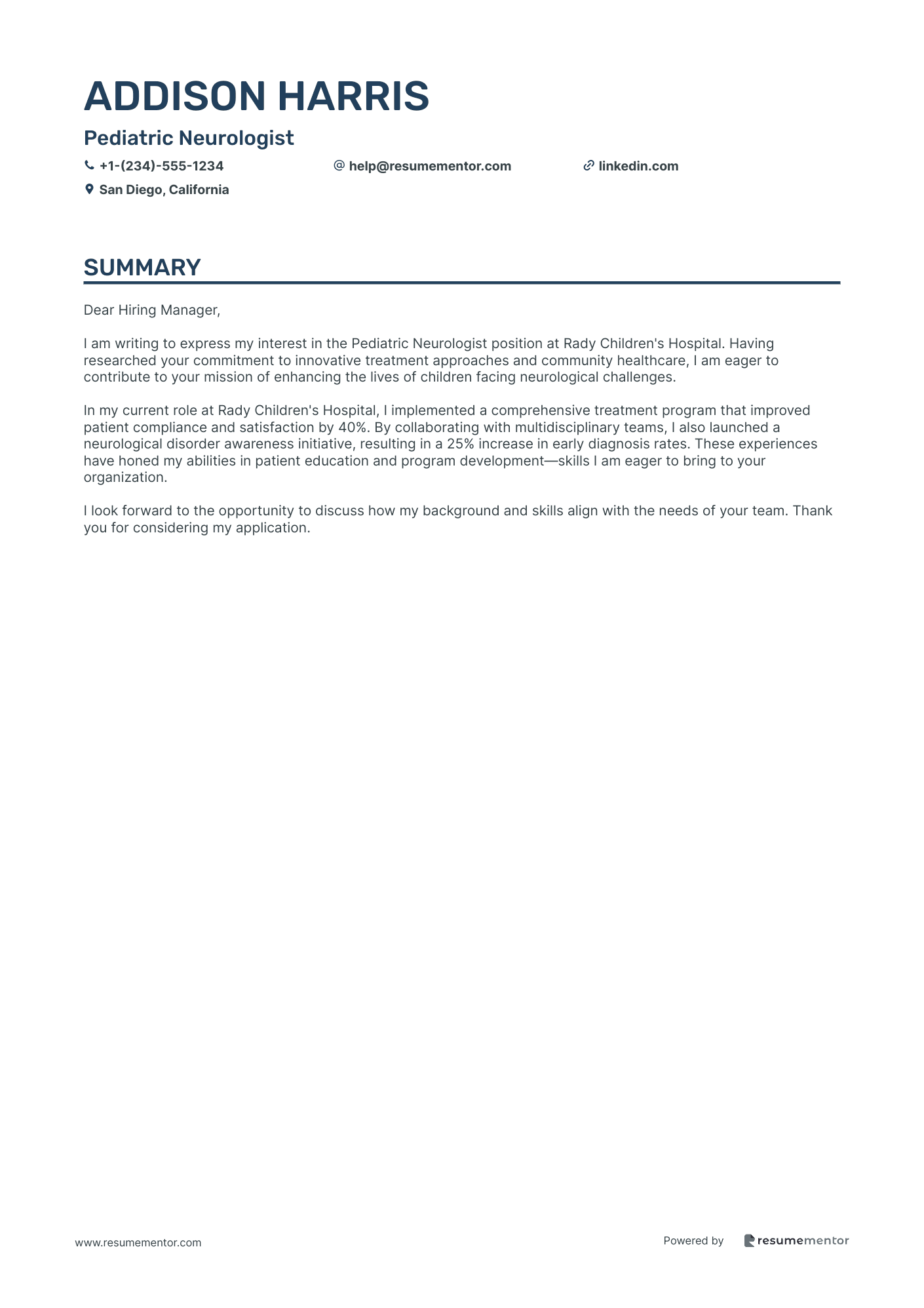
Pediatric Neurologist
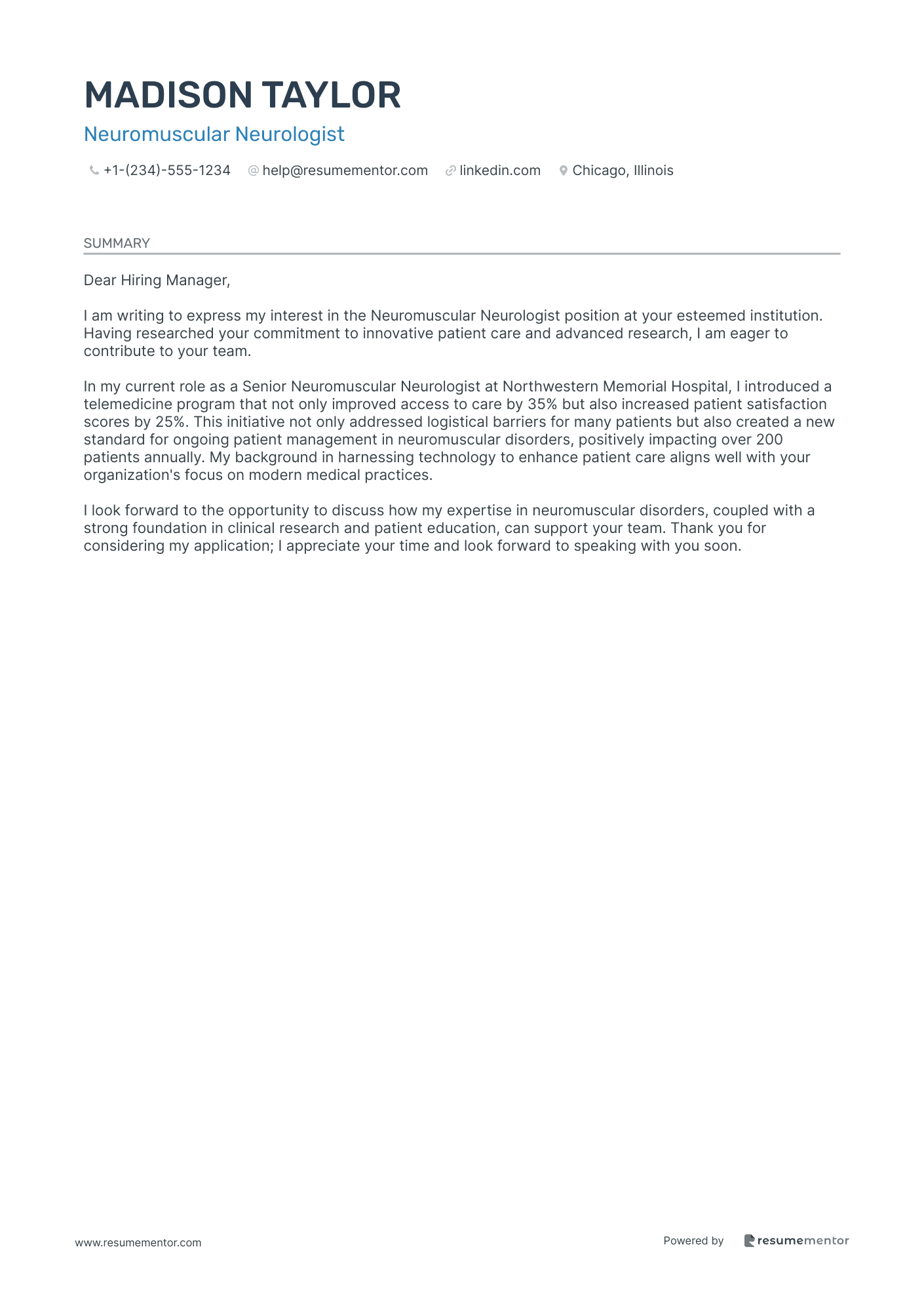
Neuromuscular Neurologist
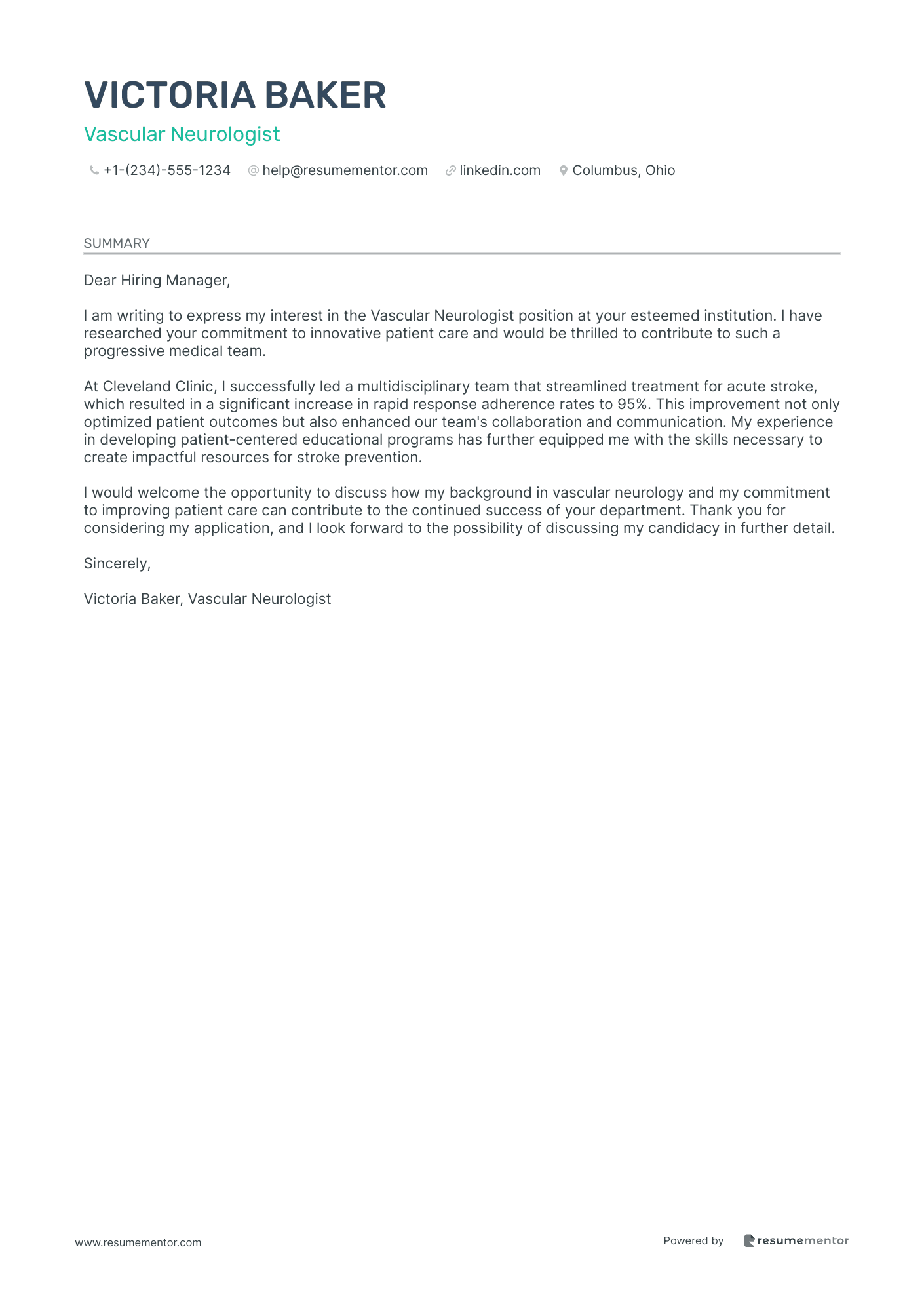
Vascular Neurologist
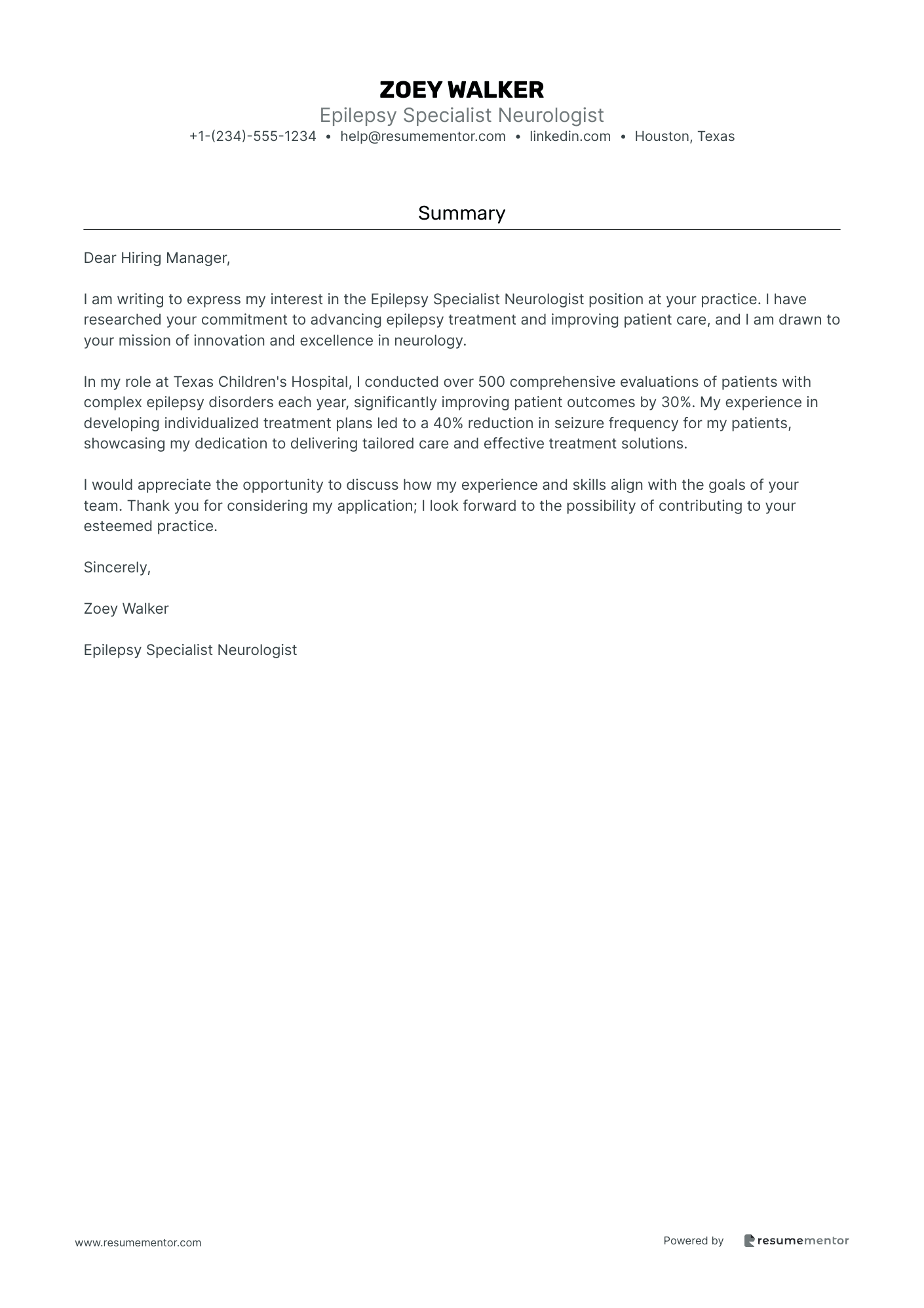
Epilepsy Specialist Neurologist
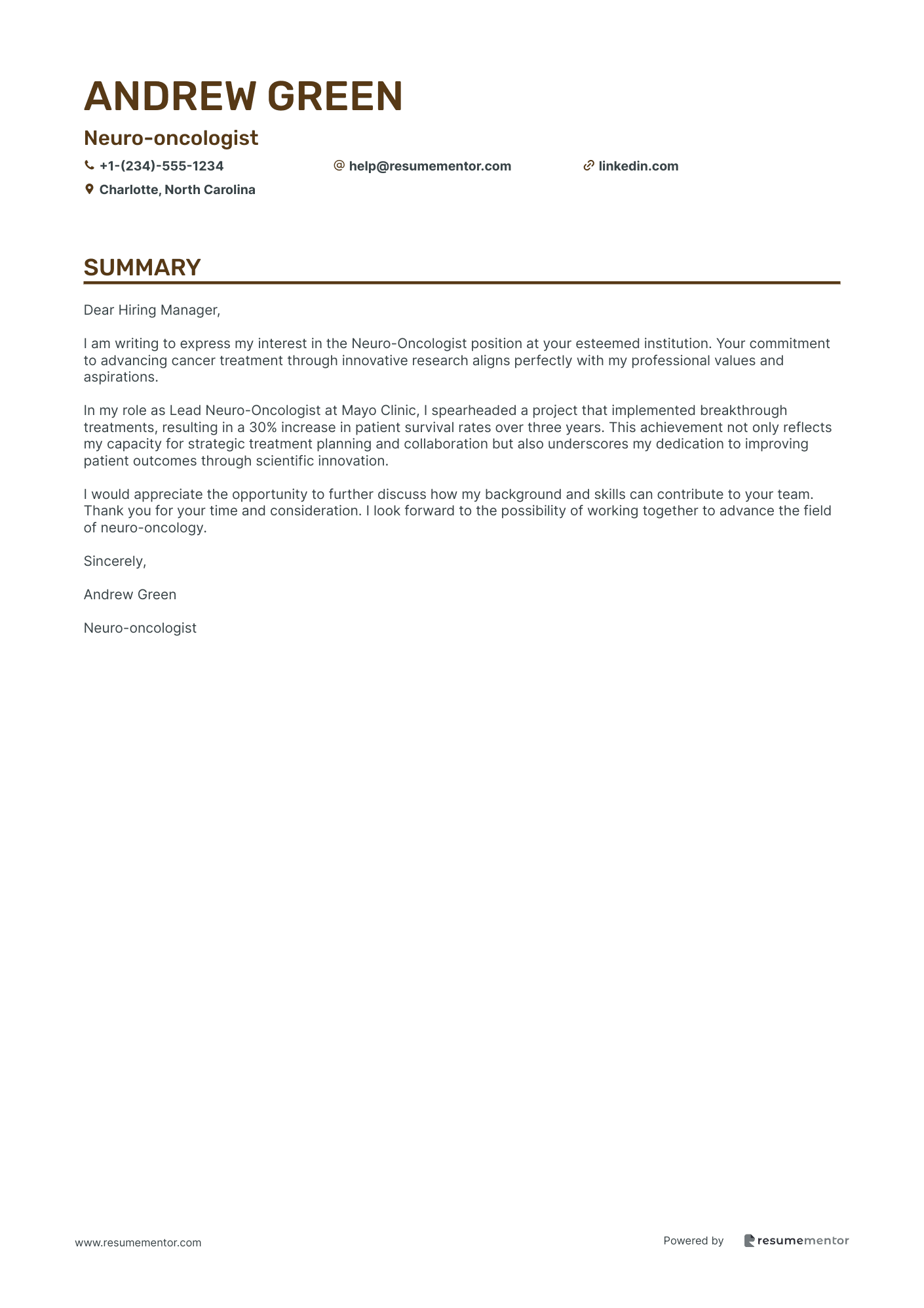
Neuro-oncologist
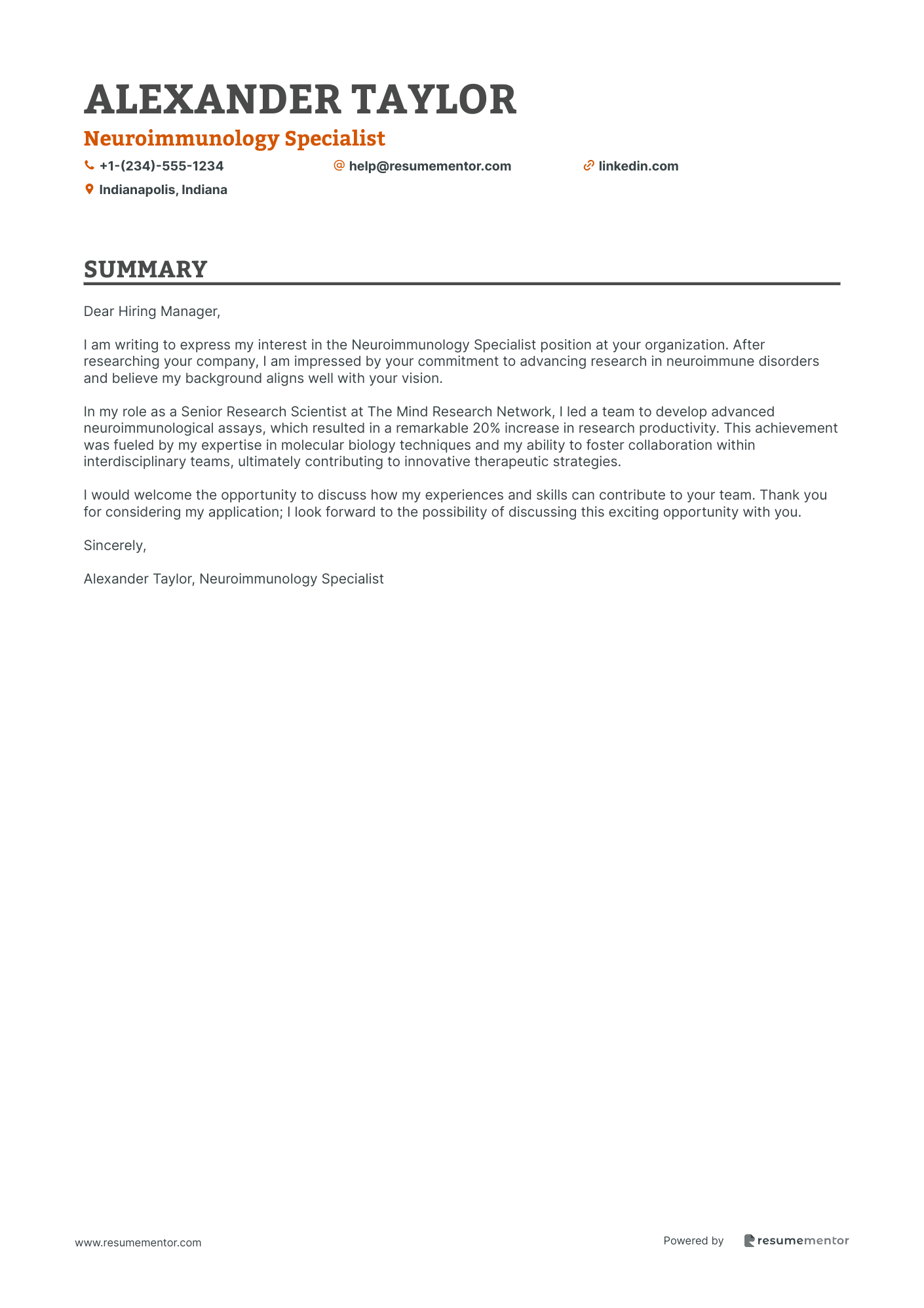
Neuroimmunology Specialist
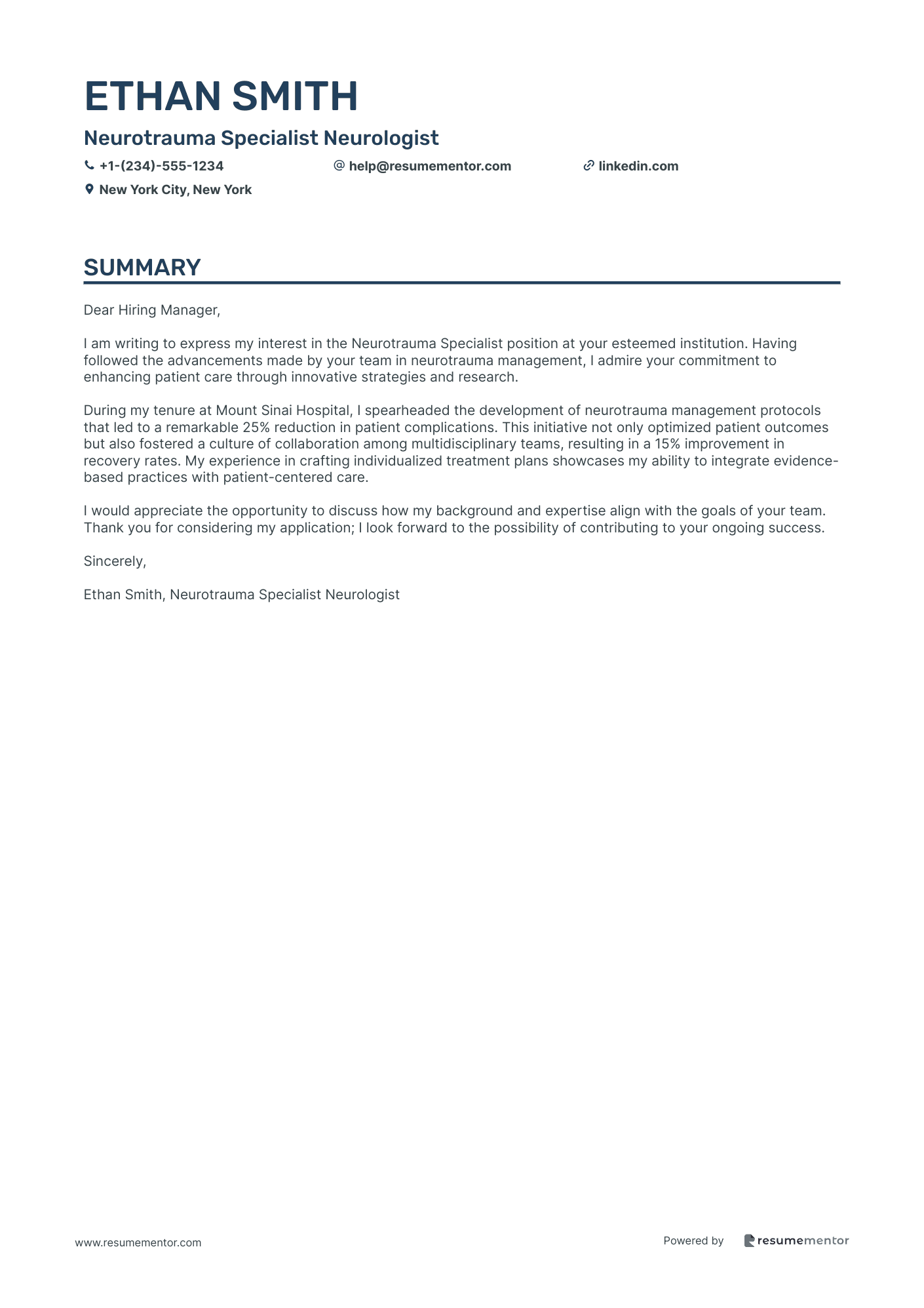
Neurotrama Specialist Neurologist
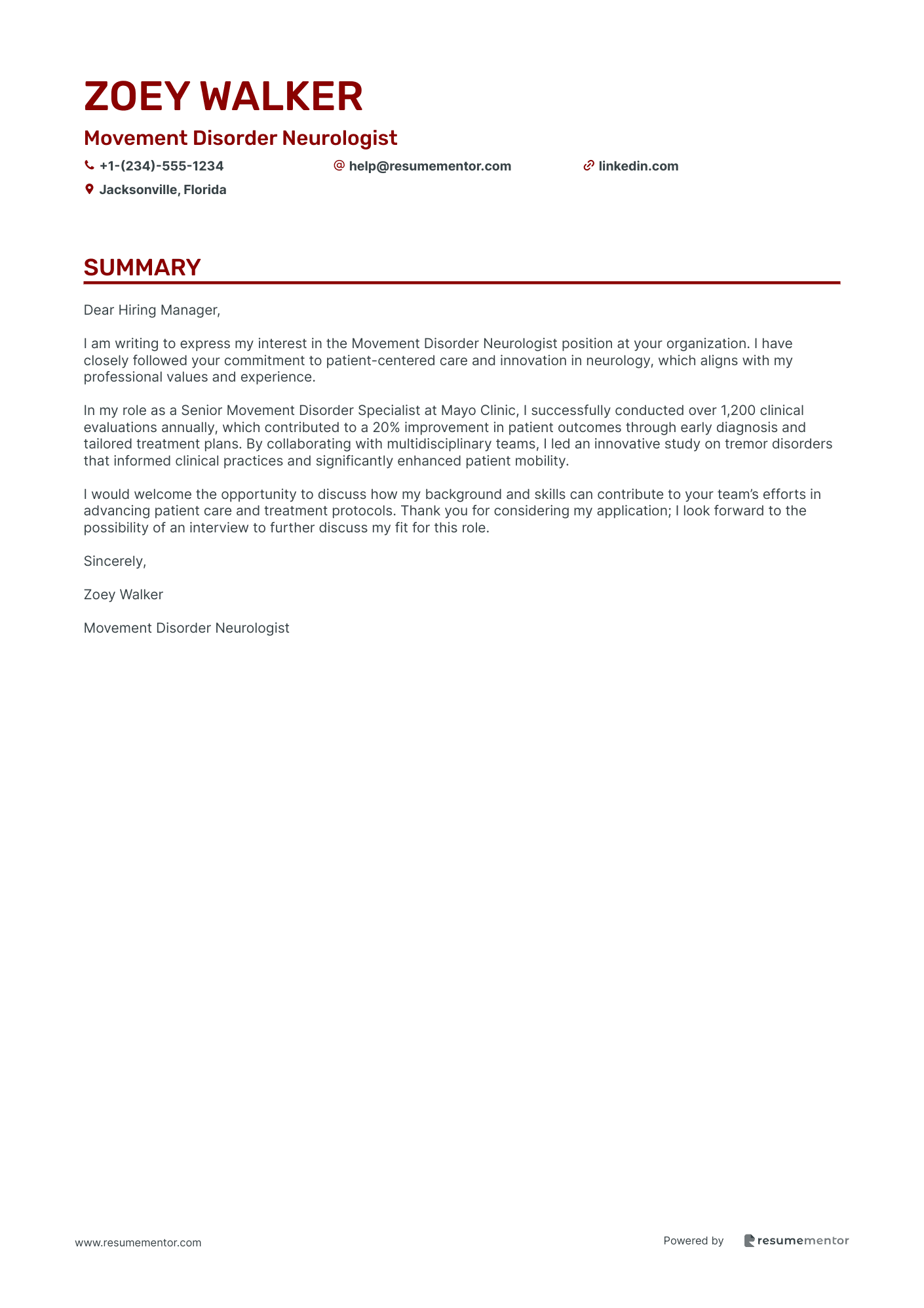
Movement Disorder Neurologist
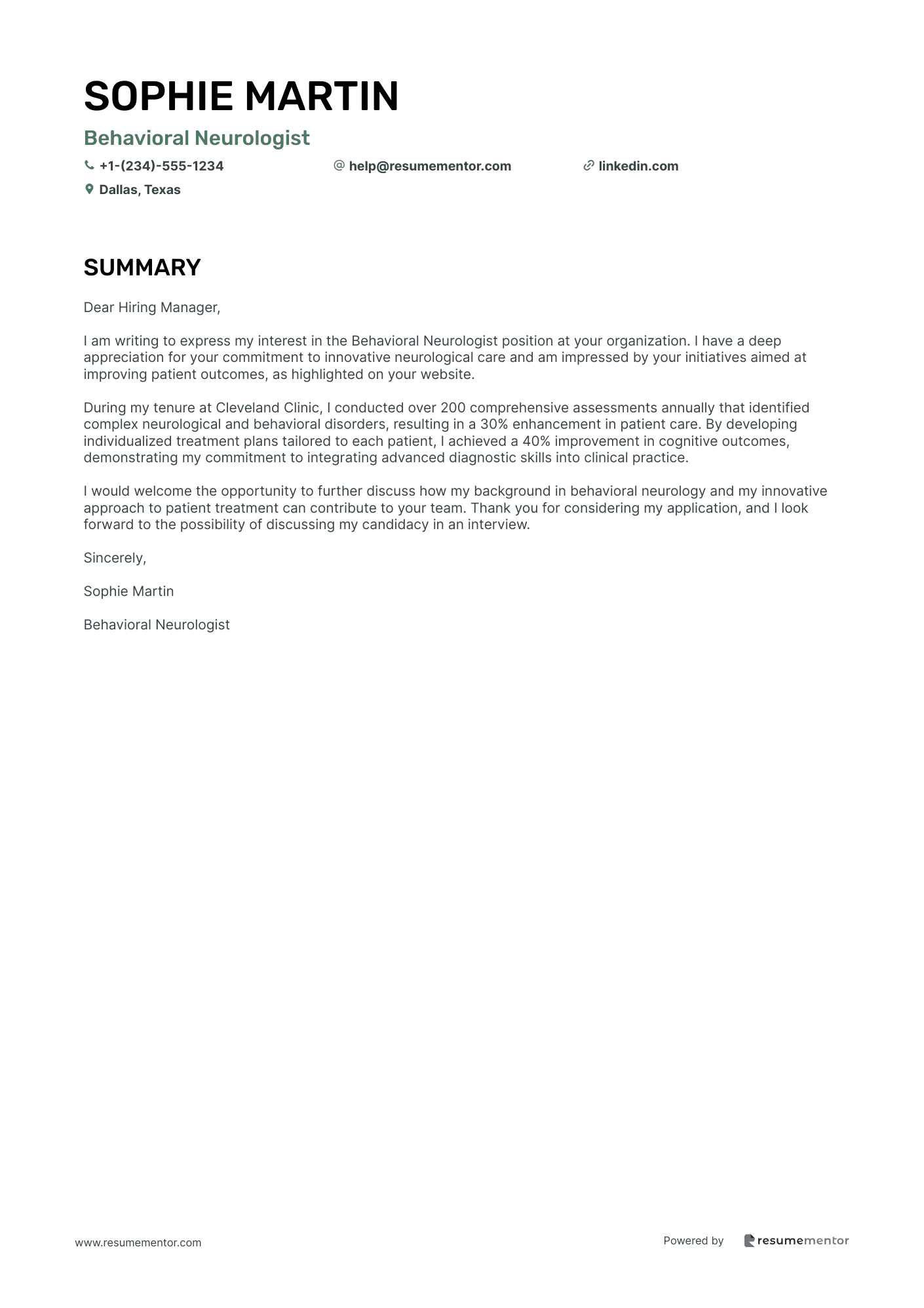
Behavioral Neurologist
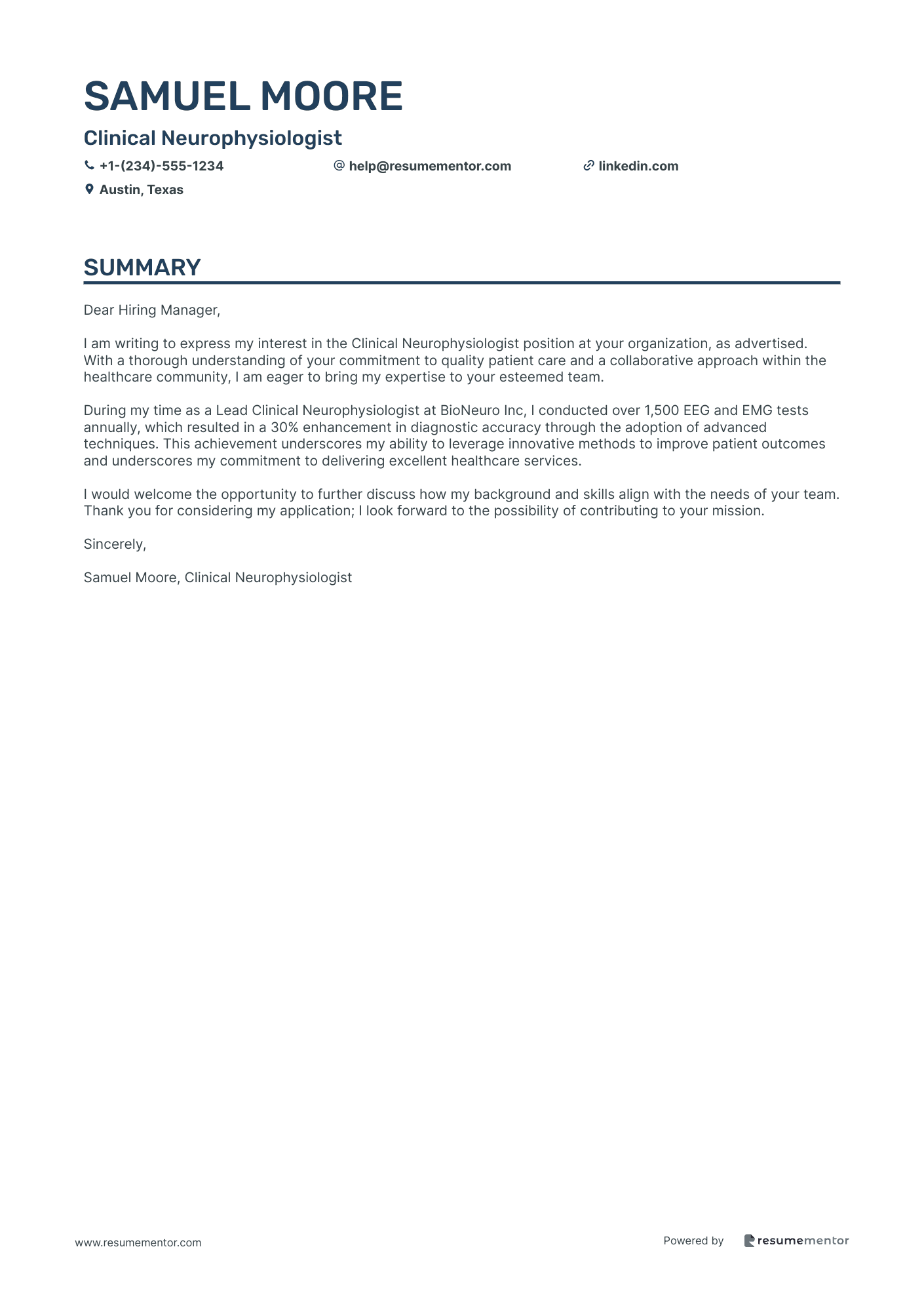
Clinical Neurophysiologist

Pediatric Neurologist cover letter sample
When applying for this role, it's essential to highlight your clinical experience working with children. Emphasize any rotations or fellowships in pediatric neurology and detail specific cases that demonstrate your expertise. Mention participation in research or any published studies that showcase your commitment to advancing the field. Include certifications like 'Child Neurology Fellowship' to illustrate your qualifications. Discuss how your diagnostic skills have led to effective treatment plans and improved patient outcomes, providing a clear 'skill-action-result' framework in your examples.
Addison Harris
Pediatric Neurologist
Summary
Dear Hiring Manager,
I am writing to express my interest in the Pediatric Neurologist position at Rady Children's Hospital. Having researched your commitment to innovative treatment approaches and community healthcare, I am eager to contribute to your mission of enhancing the lives of children facing neurological challenges.
In my current role at Rady Children's Hospital, I implemented a comprehensive treatment program that improved patient compliance and satisfaction by 40%. By collaborating with multidisciplinary teams, I also launched a neurological disorder awareness initiative, resulting in a 25% increase in early diagnosis rates. These experiences have honed my abilities in patient education and program development—skills I am eager to bring to your organization.
I look forward to the opportunity to discuss how my background and skills align with the needs of your team. Thank you for considering my application.
Neuromuscular Neurologist cover letter sample
In your cover letter, focus on your clinical experience with neuromuscular disorders. Highlight any specialized training, such as fellowships or certifications in electromyography or nerve conduction studies. Mention your strong diagnostic skills and your ability to interpret complex imaging results. Include specific cases where your assessments led to effective treatment plans or improved patient outcomes. Emphasize your collaboration with multidisciplinary teams and your commitment to ongoing education. Providing examples of successful patient interactions will demonstrate your impact on overall care and enhance your application.
Madison Taylor
Neuromuscular Neurologist
Summary
Dear Hiring Manager,
I am writing to express my interest in the Neuromuscular Neurologist position at your esteemed institution. Having researched your commitment to innovative patient care and advanced research, I am eager to contribute to your team.
In my current role as a Senior Neuromuscular Neurologist at Northwestern Memorial Hospital, I introduced a telemedicine program that not only improved access to care by 35% but also increased patient satisfaction scores by 25%. This initiative not only addressed logistical barriers for many patients but also created a new standard for ongoing patient management in neuromuscular disorders, positively impacting over 200 patients annually. My background in harnessing technology to enhance patient care aligns well with your organization's focus on modern medical practices.
I look forward to the opportunity to discuss how my expertise in neuromuscular disorders, coupled with a strong foundation in clinical research and patient education, can support your team. Thank you for considering my application; I appreciate your time and look forward to speaking with you soon.
Vascular Neurologist cover letter sample
When crafting your cover letter, emphasize your experience in diagnosing and treating cerebrovascular conditions. Highlight any advanced training or fellowships in neurology, particularly those focused on vascular issues. Make sure to mention your proficiency with diagnostic tools like MRIs and CT scans, and how you've used these skills to improve patient outcomes. Include specific examples of complex cases you've managed, showcasing your problem-solving abilities. Additionally, discuss your research contributions or publications that demonstrate your commitment to advancing the field.
Summary
Dear Hiring Manager,
I am writing to express my interest in the Vascular Neurologist position at your esteemed institution. I have researched your commitment to innovative patient care and would be thrilled to contribute to such a progressive medical team.
At Cleveland Clinic, I successfully led a multidisciplinary team that streamlined treatment for acute stroke, which resulted in a significant increase in rapid response adherence rates to 95%. This improvement not only optimized patient outcomes but also enhanced our team's collaboration and communication. My experience in developing patient-centered educational programs has further equipped me with the skills necessary to create impactful resources for stroke prevention.
I would welcome the opportunity to discuss how my background in vascular neurology and my commitment to improving patient care can contribute to the continued success of your department. Thank you for considering my application, and I look forward to the possibility of discussing my candidacy in further detail.
Sincerely,
Victoria Baker, Vascular Neurologist
Epilepsy Specialist Neurologist cover letter sample
When applying for this role, emphasize any specialized training or experience in treating epilepsy and seizure disorders. Highlight your familiarity with the latest diagnostic tools and treatment protocols. If you have conducted research or published studies, be sure to mention these to demonstrate your expertise. Showcase your ability to work collaboratively with patients, families, and a healthcare team, focusing on improved patient outcomes. Providing specific examples of how your interventions have led to successful management plans will strengthen your application and illustrate your impact.
Zoey Walker
Epilepsy Specialist Neurologist
Summary
Dear Hiring Manager,
I am writing to express my interest in the Epilepsy Specialist Neurologist position at your practice. I have researched your commitment to advancing epilepsy treatment and improving patient care, and I am drawn to your mission of innovation and excellence in neurology.
In my role at Texas Children's Hospital, I conducted over 500 comprehensive evaluations of patients with complex epilepsy disorders each year, significantly improving patient outcomes by 30%. My experience in developing individualized treatment plans led to a 40% reduction in seizure frequency for my patients, showcasing my dedication to delivering tailored care and effective treatment solutions.
I would appreciate the opportunity to discuss how my experience and skills align with the goals of your team. Thank you for considering my application; I look forward to the possibility of contributing to your esteemed practice.
Sincerely,
Zoey Walker
Epilepsy Specialist Neurologist
Neuro-oncologist cover letter sample
When applying for this specialized position, it’s important to highlight your clinical experience with brain tumors and neurological disorders. Include your proficiency in advanced imaging techniques and familiarity with current treatment protocols. If you have published research or participated in clinical trials, make sure to mention these accomplishments. Additionally, emphasize your ability to work collaboratively with multidisciplinary teams and your commitment to patient-centered care. Showcasing how your skills have led to improved patient outcomes will strengthen your application significantly.
Andrew Green
Neuro-oncologist
Summary
Dear Hiring Manager,
I am writing to express my interest in the Neuro-Oncologist position at your esteemed institution. Your commitment to advancing cancer treatment through innovative research aligns perfectly with my professional values and aspirations.
In my role as Lead Neuro-Oncologist at Mayo Clinic, I spearheaded a project that implemented breakthrough treatments, resulting in a 30% increase in patient survival rates over three years. This achievement not only reflects my capacity for strategic treatment planning and collaboration but also underscores my dedication to improving patient outcomes through scientific innovation.
I would appreciate the opportunity to further discuss how my background and skills can contribute to your team. Thank you for your time and consideration. I look forward to the possibility of working together to advance the field of neuro-oncology.
Sincerely,
Andrew Green
Neuro-oncologist
Neuroimmunology Specialist cover letter sample
When applying for this specialized role, be sure to emphasize your experience in neuroimmunology research or clinical practice. Highlight any specific projects or case studies that showcase your skills in diagnosing and treating neurological disorders. Include relevant certifications or training, such as a fellowship in neurosciences, to demonstrate your commitment. Use clear examples of how your contributions improved patient outcomes or advanced research initiatives, employing a 'skill-action-result' format to convey your impact effectively. This approach will strengthen your application.
Alexander Taylor
Neuroimmunology Specialist
Summary
Dear Hiring Manager,
I am writing to express my interest in the Neuroimmunology Specialist position at your organization. After researching your company, I am impressed by your commitment to advancing research in neuroimmune disorders and believe my background aligns well with your vision.
In my role as a Senior Research Scientist at The Mind Research Network, I led a team to develop advanced neuroimmunological assays, which resulted in a remarkable 20% increase in research productivity. This achievement was fueled by my expertise in molecular biology techniques and my ability to foster collaboration within interdisciplinary teams, ultimately contributing to innovative therapeutic strategies.
I would welcome the opportunity to discuss how my experiences and skills can contribute to your team. Thank you for considering my application; I look forward to the possibility of discussing this exciting opportunity with you.
Sincerely,
Alexander Taylor, Neuroimmunology Specialist
Neurotrama Specialist Neurologist cover letter sample
When applying for this role, it’s important to emphasize your clinical experience with brain injuries or neurological disorders. Highlight your proficiency in advanced imaging techniques, such as MRI and CT scans. Mention any specialized training, fellowships, or certifications in neurotrauma or critical care neurology you have completed. Share specific cases where your intervention improved patient outcomes, using a ‘skill-action-result’ approach. Additionally, emphasizing your collaboration with multidisciplinary teams will showcase your ability to lead patient care effectively while also improving treatment protocols.
Ethan Smith
Neurotrauma Specialist Neurologist
Summary
Dear Hiring Manager,
I am writing to express my interest in the Neurotrauma Specialist position at your esteemed institution. Having followed the advancements made by your team in neurotrauma management, I admire your commitment to enhancing patient care through innovative strategies and research.
During my tenure at Mount Sinai Hospital, I spearheaded the development of neurotrauma management protocols that led to a remarkable 25% reduction in patient complications. This initiative not only optimized patient outcomes but also fostered a culture of collaboration among multidisciplinary teams, resulting in a 15% improvement in recovery rates. My experience in crafting individualized treatment plans showcases my ability to integrate evidence-based practices with patient-centered care.
I would appreciate the opportunity to discuss how my background and expertise align with the goals of your team. Thank you for considering my application; I look forward to the possibility of contributing to your ongoing success.
Sincerely,
Ethan Smith, Neurotrauma Specialist Neurologist
Movement Disorder Neurologist cover letter sample
When crafting your cover letter, focus on your clinical experience related to neurodegenerative diseases. Highlight any fellowships or specialized training in movement disorders. Showcase your proficiency in diagnosing and managing conditions like Parkinson's and essential tremor, as well as your experience with advanced treatment options such as deep brain stimulation. Include examples of how your interventions improved patient quality of life or outcomes, using a 'skill-action-result' framework. Emphasize your ability to work collaboratively with multidisciplinary teams to enhance patient care.
Zoey Walker
Movement Disorder Neurologist
Summary
Dear Hiring Manager,
I am writing to express my interest in the Movement Disorder Neurologist position at your organization. I have closely followed your commitment to patient-centered care and innovation in neurology, which aligns with my professional values and experience.
In my role as a Senior Movement Disorder Specialist at Mayo Clinic, I successfully conducted over 1,200 clinical evaluations annually, which contributed to a 20% improvement in patient outcomes through early diagnosis and tailored treatment plans. By collaborating with multidisciplinary teams, I led an innovative study on tremor disorders that informed clinical practices and significantly enhanced patient mobility.
I would welcome the opportunity to discuss how my background and skills can contribute to your team’s efforts in advancing patient care and treatment protocols. Thank you for considering my application; I look forward to the possibility of an interview to further discuss my fit for this role.
Sincerely,
Zoey Walker
Movement Disorder Neurologist
Behavioral Neurologist cover letter sample
When applying for this position, it's essential to highlight any clinical experience with brain injury or neurodegenerative diseases. Showcase your understanding of neuroanatomy and cognitive function assessments. If you have completed relevant internships or fellowships in neurology, mention these to demonstrate your hands-on expertise. Include any research projects or publications related to behavioral assessments to reinforce your credibility. Additionally, discuss your capacity to work in multidisciplinary teams, outlining how your collaborative efforts have improved patient outcomes or contributed to innovative treatment approaches.
Summary
Dear Hiring Manager,
I am writing to express my interest in the Behavioral Neurologist position at your organization. I have a deep appreciation for your commitment to innovative neurological care and am impressed by your initiatives aimed at improving patient outcomes, as highlighted on your website.
During my tenure at Cleveland Clinic, I conducted over 200 comprehensive assessments annually that identified complex neurological and behavioral disorders, resulting in a 30% enhancement in patient care. By developing individualized treatment plans tailored to each patient, I achieved a 40% improvement in cognitive outcomes, demonstrating my commitment to integrating advanced diagnostic skills into clinical practice.
I would welcome the opportunity to further discuss how my background in behavioral neurology and my innovative approach to patient treatment can contribute to your team. Thank you for considering my application, and I look forward to the possibility of discussing my candidacy in an interview.
Sincerely,
Sophie Martin
Behavioral Neurologist
Clinical Neurophysiologist cover letter sample
When applying for this role, it's essential to showcase your experience with neurophysiological assessments and data analysis. Highlight any certifications or training in techniques like EEG or EMG, and include specific hours or projects that demonstrate your expertise. Mention collaborations with multidisciplinary teams to improve patient outcomes. Use real examples of how your assessment skills have contributed to diagnosis or treatment plans using a 'skill-action-result' format. Additionally, emphasize your ability to communicate complex information clearly to patients and healthcare professionals alike.
Samuel Moore
Clinical Neurophysiologist
Summary
Dear Hiring Manager,
I am writing to express my interest in the Clinical Neurophysiologist position at your organization, as advertised. With a thorough understanding of your commitment to quality patient care and a collaborative approach within the healthcare community, I am eager to bring my expertise to your esteemed team.
During my time as a Lead Clinical Neurophysiologist at BioNeuro Inc, I conducted over 1,500 EEG and EMG tests annually, which resulted in a 30% enhancement in diagnostic accuracy through the adoption of advanced techniques. This achievement underscores my ability to leverage innovative methods to improve patient outcomes and underscores my commitment to delivering excellent healthcare services.
I would welcome the opportunity to further discuss how my background and skills align with the needs of your team. Thank you for considering my application; I look forward to the possibility of contributing to your mission.
Sincerely,
Samuel Moore, Clinical Neurophysiologist
Related Articles

Continue Reading
Check more recommended readings to get the job of your dreams.
Resume
Resources
Tools
© 2026. All rights reserved.
Made with love by people who care.
